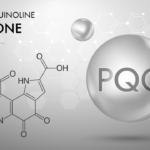
Coenzyme Q10 (CoQ10) Supplement – Top 8 Reasons You Need This In Your Medicine Cabinet
Table of Contents:
- What is CoQ10?
- What does CoQ10 do and how does it work?
- 8 Reasons to have CoQ10 in your medicine cabinet
- Recommended Dosing
- Side Effects
- The effect of Statins on CoQ10
- Why CoQ10 is used in my Neuro Protocol
Every second, as we walk, speak, and live our lives, there are millions of chemical reactions taking place within our cells. These chemical reactions are necessary to our very existence. But what powers the cells to perform these life-giving reactions? What happens if this process slows down and begins to underperform? How can we not only support this process but maximize it as we age?
Meet Coenzyme Q10 (CoQ10).
Despite its peculiar name, coenzyme Q10 is a nutrient created by your body every day. The problem lies in that it is not always made in a sufficient quantity. That’s why we’re covering the topic, showing you evidence about coenzyme Q10 benefits, its mechanism of action, and why I include this in my neuro-protocol for my patients. We’re also reviewing the recommended dosage and everything you need to know before using coenzyme Q10 in your daily regimen.
What is CoQ10
We can write it as coenzyme Q10 or break it down to CoQ10. If you want a more technical name, it would be ubiquinone or ubidecarenone. As a coenzyme, it is a compound that joins enzymes together to boost their function or activate them. It is also a potent antioxidant.
In the body, CoQ10 is created by an organelle known as mitochondria. Mitochondria are the cell’s powerhouses and devote no less than 12 proteins to manufacture coenzyme Q10. It all happens in the mitochondrial membrane, and when not enough CoQ10 is synthesized, the body starts to run out of energy. With these qualities, CoQ10 is regarded as an essential nutrient.(1,2).
CoQ10 was discovered in the decade of the 1950s while many researchers were focused on unveiling the secrets of the mitochondria. Frederick Crane first found this nutrient and published his findings in 1957. After that, Peter Mitchell and other researchers revealed the importance of this compound to create energy at the cellular level (3).
Today, CoQ10 is produced by chemical synthesis, microbial fermentation, or extracted from biological tissues to make it available in a supplement form.
But why would anyone need coenzyme Q10 if every cell in the body has mitochondria synthesizing this substance?
It turns out that CoQ10 levels decline as we age, and our cells begin to lose their ability to create this essential nutrient. When the mitochondria runs out of CoQ10, it will produce less ATP, which is essentially a fuel molecule. Think of ATP like gasoline for your engine. That is why many people need a supplemental source of coenzyme Q10 (1).
What does CoQ10 do, and how does it work?
Coenzyme Q10 is a versatile substance, and it has many roles within the body. For our purposes, we can break these down into the following (1,2):
- Increases cell energy output: It speeds up the energy production of ATP, which is a fuel substance in the body that activates enzymes and makes everything function more economically in our cells. That’s why people who run out of CoQ10 display symptoms such as lethargy and fatigue.
- Aids mitochondria in their function: CoQ10 is a very active electron donor and receiver. Electron movement is critical inside the mitochondria, and CoQ10 works as an intermediary in this transaction.
- Acts as an antioxidant: Antioxidants protect the cells from free radical damage, which can play a role in heart disease, cancer, and other diseases. More technically, CoQ10 is vital in REDOX chemical reactions, which help the antioxidant process. It counters reactive oxygen species (ROS) substances by donating an electron, therefore neutralizing their effect. Thus, CoQ10 has a potent antioxidant potential.
- Renews the antioxidant potential of other substances: Vitamin C and vitamin E are known antioxidant substances, but they have a limited capacity to protect us from free radicals. After neutralizing free radicals with their electrons, their chemical structure changes, slowly becoming useless. CoQ10 stabilizes vitamin C and vitamin E to renew their antioxidant potential. Instead of requiring another dose of these vitamins, CoQ10 will allow you to benefit from them for a longer time.
- Scavenges free radicals: Free radicals are unstable substances that react with body tissues and steal electrons from them. They change the typical structure and function of proteins, membranes, and DNA molecules. That’s how they contribute to the aging process, cancer, and other ailments. Antioxidants like CoQ10 are free radical scavengers. They detect and neutralize free radicals. However, CoQ10 is a lipid soluble scavenger and therefore is widespread throughout the cell.
- Makes use of LDL cholesterol: A fascinating fact is that CoQ10 is lipid-soluble and one of the few nutrients that use LDL cholesterol for transport throughout the body. This “bad” cholesterol molecule carries CoQ10 in the blood because it doesn’t mobilize as well in the water-soluble environment of blood. Once it reaches the lymphatic system, CoQ10 is further distributed because lymph carries lipid-soluble substances without a problem.
8 Reasons to Have CoQ10 in Your Medicine Cabinet
Considering the function of CoQ10 in the cells, we can pinpoint a few benefits to including it in your daily regimen:
- Neurologic benefits: The brain is the most energy-consuming organ in our anatomy. It handles thousands of reactions and connections instantaneously, requiring 20% of the daily energy output of your entire body. CoQ10 serves a pivotal role in producing fuel in the brain’s cells. A deficiency can be as bad as to lead to Parkinson’s disease, Huntington’s disease, and other neurodegenerative conditions. The cerebellum is essential for movement regulation and coordination. Not having enough CoQ10 makes this structure vulnerable to atrophy. Brain neurons have multiple connections with with each other, as well as structures outside of the brain. CoQ10 is critical in mediating these connections and keeping the brain in contact with the body’s other vital systems. Thus, it has a beneficial effect on the circadian rhythm, reducing cardiovascular events, and stabilizing the body against emotional triggers, sleep deprivation, and other adverse events (4).
- In heart failure patients: CoQ10 has an exciting role in treating patients with heart failure. Supplementation can increase the heart’s pump action by 6-10% after a couple of months, improving the quality of life in these patients. A study known as the Kisel-10 Study showed that just 200 mg of CoQ10 combined with organic selenium decreased significant adverse cardiac events by almost 50%. There was a decrease in Major Adverse Cardiac Events, Cardiac Deaths (Down by 43%), and all-cause of fatality (down by 42%) (5).
- In periodontal disease: This substance also has an application in oral health. It improves periodontal disease by reducing the gingival crevicular fluid flow, the plaque index, and decreases bleeding episodes (6).
- Effects on fertility: There are mitochondria in female eggs as well. Accordingly, recent studies show that CoQ10 restores the mitochondrial function in oocytes. Thus, their quality remains untouched for a longer period of time and makes them more resistant to age-related decline (7).
- Skin benefits: The antioxidant capacity of CoQ10 also has anti-aging potential, and has been proposed as an anti-wrinkle agent. It brings back a smooth appearance in the skin and prevents age-related degeneration. Recent studies have developed different methods to deliver CoQ10 to the skin effectively to fully make use of this benefit in the cosmetic industry (8).
- In patients with diabetes: In a comprehensive study that involved 13 clinical trials, a group of researchers combined their results and concluded that CoQ10 has a potential role in assisting with glycemic control in type 2 diabetes. It may also reduce triglycerides and improve HDL levels in these patients (9).
- Cancer prevention: Breast cancer and melanoma patients often have low levels of CoQ10. A deficiency is even more common in metastasis and advanced cancer. According to studies, it inhibits uncontrolled cell growth and induces apoptosis in abnormal cells. It can be helpful to prevent prostate cancer, breast cancer, lung cancer, and certain types of skin cancer (10).
- Benefits in respiratory function: Besides preventing lung cancer, CoQ10 can also attenuate lung fibrosis, improving respiratory function in these patients (11).
Recommended dosing
The recommended dose depends on the condition you’re trying to prevent, and most clinical trials use a dose of 200-300 mg. However, patients with coenzyme Q10 deficiency can receive up to 2400 mg a day, depending on the severity of their condition.
In most cases, the dose is calculated with the formula of 2 mg/kg daily, and it can be divided into two or three doses.
Side effects
Safety studies show that CoQ10 does not induce serious adverse effects in humans. Very high doses have been used with no significant side effects. The highest dose used with no recorded adverse effects was 1200 mg/kg/day (12).
Despite being well tolerated by most, some users have reported skin rashes and gastrointestinal symptoms such as diarrhea, nausea, and vomiting. It might also lower your blood pressure.
The effect of statins on CoQ10
Statin drugs appear to reduce the cell’s ability to make and process CoQ10. Okuyama in 2015 summarized evidence that statins depleted CoQ10 and reduced ATP production. This only means that heart failure patients with statin treatment may require a higher dose of coenzyme Q10 than the average patient (13).
Statins are common drugs in congestive heart failure patients. Therefore CoQ10 supplementation is imperative in order to achieve a significant benefit in these patients. Thus, it is essential to understand the interaction between statins and coenzyme Q10 in these patients.
Why CoQ10 is used in my Neuro Protocol
The benefits of CoQ10 in the neurologic system can be summarized as follows:
- Higher efficiency of brain mitochondria to produce energy
- Protection against atrophy in nerve structures
- Strengthening brain connections to other organs, especially the heart
When it finally reaches the brain, CoQ10 cranks up cellular activity. When I couple this ingredient with others in my protocol, we can create new mitochondria, which means more energy in every cell, favoring cell repair and neuroplasticity.
In case of brain damage, Alzheimer’s disease, Parkinson’s, and other ailments, CoQ10 works in symbiosis with these ingredients to protect nerve cells and their connections (14, 15).
- https://www.sciencedirect.com/science/article/pii/S0005272816300846
- https://www.ncbi.nlm.nih.gov/pmc/articles/PMC5943198/
- https://www.sciencedirect.com/science/article/abs/pii/S1567724907000566
- https://benthamopen.com/contents/pdf/TONUTRAJ/TONUTRAJ-4-69.pdf
- https://www.ncbi.nlm.nih.gov/pmc/articles/PMC4666408/
- https://www.sciencedirect.com/science/article/abs/pii/0098299794900345
- https://onlinelibrary.wiley.com/doi/full/10.1111/acel.12368
- https://www.tandfonline.com/doi/abs/10.1080/03639045.2017.1391836
- https://www.hindawi.com/journals/ije/2018/6484839/
- https://www.sciencedirect.com/science/article/pii/S1084952119300709
- https://www.sciencedirect.com/science/article/pii/S075333221834873X
- https://iubmb.onlinelibrary.wiley.com/doi/abs/10.1002/biof.5520320124
- https://www.karger.com/Article/FullText/486374
- https://www.ingentaconnect.com/content/ben/ctmc/2016/00000016/00000008/art00008
- https://www.sciencedirect.com/science/article/abs/pii/S0969996104002712

